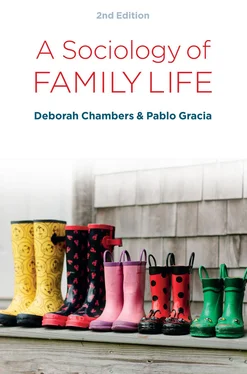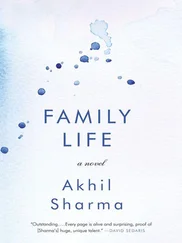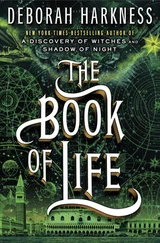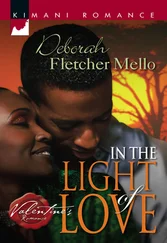Deborah Chambers - A Sociology of Family Life
Здесь есть возможность читать онлайн «Deborah Chambers - A Sociology of Family Life» — ознакомительный отрывок электронной книги совершенно бесплатно, а после прочтения отрывка купить полную версию. В некоторых случаях можно слушать аудио, скачать через торрент в формате fb2 и присутствует краткое содержание. Жанр: unrecognised, на английском языке. Описание произведения, (предисловие) а так же отзывы посетителей доступны на портале библиотеки ЛибКат.
- Название:A Sociology of Family Life
- Автор:
- Жанр:
- Год:неизвестен
- ISBN:нет данных
- Рейтинг книги:3 / 5. Голосов: 1
-
Избранное:Добавить в избранное
- Отзывы:
-
Ваша оценка:
- 60
- 1
- 2
- 3
- 4
- 5
A Sociology of Family Life: краткое содержание, описание и аннотация
Предлагаем к чтению аннотацию, описание, краткое содержание или предисловие (зависит от того, что написал сам автор книги «A Sociology of Family Life»). Если вы не нашли необходимую информацию о книге — напишите в комментариях, мы постараемся отыскать её.
A Sociology of Family Life With a global focus, and blending theory with real-life examples, this insightful and engaging book will remain indispensable to students across the social sciences.
A Sociology of Family Life — читать онлайн ознакомительный отрывок
Ниже представлен текст книги, разбитый по страницам. Система сохранения места последней прочитанной страницы, позволяет с удобством читать онлайн бесплатно книгу «A Sociology of Family Life», без необходимости каждый раз заново искать на чём Вы остановились. Поставьте закладку, и сможете в любой момент перейти на страницу, на которой закончили чтение.
Интервал:
Закладка:
Regarding the final question, the lack of accurate historical sociological data about kinship relations among Black and minority ethnic communities in western societies is pinpointed in chapters that examine both macro- and micro-social dynamics of family life. Evidence of parallels and differences between host communities and minority ethnic kinship customs are addressed. Past sociological research on Black and minority ethnic families has been framed by an ethnocentric bias: the predisposition for western academics to interpret minority ethnic families from a white ethnic viewpoint. Such frames privilege white and typically middle-class family norms by assuming these norms to be inherently superior. Scholars, governments and popular cultural discourses have been inclined to reify or naturalize the white nuclear family, even though it has existed as simply one type of family among many others. The nuclear family is an abstract entity often discussed as if it existed as a real and tangible object, rather than an ideal. Through a range of official and informal discourses, this ideological construct is elevated as a norm. The chapters of this book attend to the ideological assumptions and misconceptions that have contributed to earlier and more recent sociological theory and policy debates about ‘the family’. These assertions are examined in relation to research evidence of actual families and people’s lives to identify and understand the richness and complexities of contemporary familial and intimate relations.
Organization of the book
The book’s chapters are organized in two broad ways. The first arrangement comprises an outline of major theoretical perspectives followed by critiques and reconsiderations generated by empirical studies. This approach is taken in chapters that deal with theories and debates about intimacy, parenting and childhood. For instance, new scholarship in feminist and queer studies on same-sex intimacies, parenting and household practices that contest entrenched explanations of ‘family’ and parenting have redefined approaches to family and personal life. Examples of this body of research are then assessed to show how debates about family life and intimacy have been advanced. Likewise, scholarship on Black and minority ethnic families and intimacies has either informed or challenged conventional thinking about family forms and meanings, and is included to allow students to consider the discrepancies between standard and new ways of thinking about families. Other chapters are organized around a second, case-study approach. This approach is used in sections that address global themes including migration and marriage strategies, fertility and populations, and reproductive technologies. These sections draw on circumstances and events in specific countries through a comparative set of examples to illustrate key processes and changes in family forms and practices.
Chapter 1traces the historical roots associated with key concepts of kinship and family in sociology. Foundational approaches to the family and kinship, developed in anthropology and sociology from the late nineteenth century to the 1980s, are outlined. The way classical social theories defined family life and how their perspectives influenced modern thought are assessed. The roots of some of today’s enduring ideas about the family are uncovered by outlining the perspectives of nineteenth-century thinkers such as Marx and Engels. The early twentieth-century structural-functionalist approach, led by American sociologist Talcott Parsons, proposed that the small, nuclear version of the family was perfectly adapted to the needs of modern society. He introduced new ideas about how the nuclear family’s sex roles operate to reproduce the population and a stable workforce. For Parsons, the family served two vital functions: the socialization of children, and the stabilization of adult personalities. The strict division of sex roles, between the father’s instrumental role as breadwinner and the mother’s expressive role as homemaker, was viewed as well adapted to modern industrial society. The functionalist model has had a major impact on official discourses about the ideal nuclear family in the UK and USA from the 1960s. It influenced academic research and government strategies up to the late twentieth century through policies on child and family poverty, including childrearing practices, childhood education, the role and moral framework of parenthood, fertility and access to new reproductive technologies. Chapter 1also assesses the impact of functionalist approaches in studies of Black and minority ethnic families in the USA and UK, where extended and matriarchal, 3one-parent families were perceived as deviations from a nuclear family form.
Public anxieties about loosening family ties in modern industrial societies proved to be unfounded, according to many studies of the mid twentieth century. The strength and importance of generational ties were revealed in classic British studies of family and kinship (for example, Bell 1968; Rosser and Harris 1965; Young and Willmott 1957). Informal relationships were highly significant at personal and structural levels. Chapter 1also addresses the principal feminist perspectives of the 1970s and 1980s on the family, sex, gender and patriarchy, 4which directly critiqued the functionalist perspective. This feminist work revealed the ways in which the institution of ‘the family’ reproduces patriarchal and heteronormative versions of masculinity and femininity. Feminist perspectives contributed to new understandings of how inequalities of gender, class and race are reproduced through family and wider social structures and relations.
Public concerns about the erosion of mutual responsibility and long-term commitment lie at the heart of arguments about a decline in family values. Chapter 2explores theories and debates from the 1990s about changes in intimate relationships. The concept of ‘individualization’ advanced by a group of scholars including Giddens, and Beck and Beck-Gernsheim, to explain the rise of more egalitarian intimate relationships is assessed in depth. The chapter explains changing ideas about love and commitment, the changing nature of the self and society, and the notion of the pure relationship. Children are held as providers of a more permanent love during a time when long-term commitment between adults is suspect. These explanations are challenged by a range of evidence from empirical research which is addressed in the second half of the chapter. A series of recent and mainly qualitative studies on intimacy has provoked a reassessment of late modern theory and fed into critiques of the individualization thesis.
Debates about changes in parenting values and practices are assessed in chapter 3. Changing notions and practices of motherhood, pinpointed by feminist debates, correspond with women’s improved education and entrance into the labour market. The identification of a ‘new’ parenthood that emerges out of separation and divorce has shaped definitions and practice of both mothering and fathering. The theme of parenting is followed by a focus on current ideas about fatherhood and masculinity. New models of fatherhood have been prompted by the erosion of the male breadwinner role, the rise in post-divorce families and families without fathers. Public discourses about a new kind of Dad, based on the model of ‘active fatherhood’, are displacing the notion of the father as ‘male breadwinner’ and unemotional disciplinarian. As a result, fatherhood is being reconstructed in law and social policy. The chapter addresses the idea of ‘involved fatherhood’ promoted by the state in the UK and USA, followed by a critical analysis of the harmful consequences of domestic violence, especially among women and children. The chapter also addresses the issue of parenting among ethnic minority families. Furthermore, the challenges and opportunities faced by LGBTQ+ parents in contemporary societies are examined in the chapter.
Читать дальшеИнтервал:
Закладка:
Похожие книги на «A Sociology of Family Life»
Представляем Вашему вниманию похожие книги на «A Sociology of Family Life» списком для выбора. Мы отобрали схожую по названию и смыслу литературу в надежде предоставить читателям больше вариантов отыскать новые, интересные, ещё непрочитанные произведения.
Обсуждение, отзывы о книге «A Sociology of Family Life» и просто собственные мнения читателей. Оставьте ваши комментарии, напишите, что Вы думаете о произведении, его смысле или главных героях. Укажите что конкретно понравилось, а что нет, и почему Вы так считаете.












